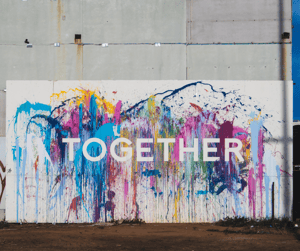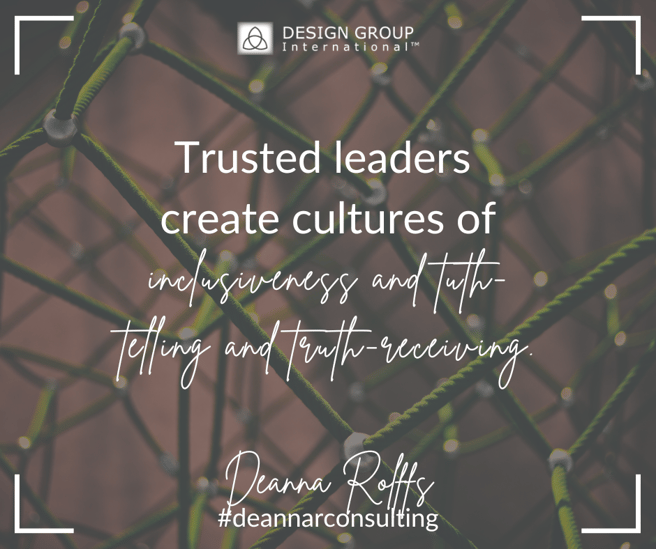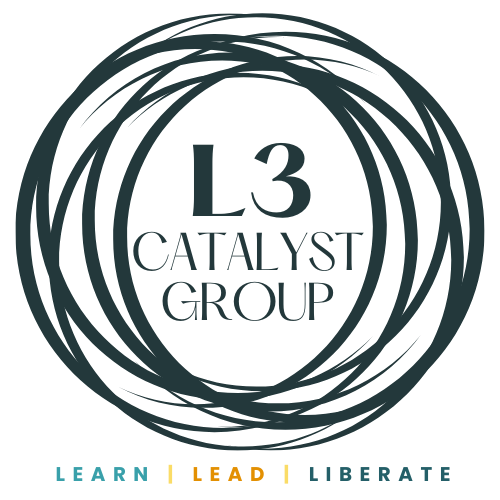It's hard to speak truth to power.
Your supervisor may not want to hear a conflicting truth.
The CEO thinks their strategy is the best.
An executive cabinet is blind to the context elsewhere in the organization.
Can efforts toward improvement be effective if leaders aren't listening?
Power dynamics make it difficult to tell and receive the truth. Hierarchical organizations and inequity exacerbate this divide. When we don't tell –and receive– complex truths from others, we can't lead well together. When those in positions lowest on the organizational chart don't feel safe sharing what they are experiencing, how can we hope to foster meaningful change?
 Dominant narratives about leadership widen the divide and make truth-telling harder. Leaders are believed to be the most qualified, have the most expertise, perform the hardest jobs, know the answers, and deserve to get paid at much higher rates than others in the organization.
Dominant narratives about leadership widen the divide and make truth-telling harder. Leaders are believed to be the most qualified, have the most expertise, perform the hardest jobs, know the answers, and deserve to get paid at much higher rates than others in the organization.
On the flip side, there are presumptions about people at entry level or primarily client-facing positions. People in these positions are presumed to have fewer qualifications, less expertise, can be easily replaceable with turnover, and they don't get paid nearly as well. They receive less respect and are vital to meeting the organizational mission.
I'd love to spark our thinking regarding the costs of vast divides between those farthest apart on organizational charts.
Leaders are buffered from reality. Organizations would be transformed if we narrowed the divide between executive and front-line staff.
Without addressing this divide, leaders misstep. Informed decisions are harder if we are too separated to be adequately informed. Our egos and agendas can drive siloed change efforts instead of theories of change being implemented consistently and effectively across the organization. Without the wisdom and experience of those on the front lines, those in executive leadership are missing significant truth, operating with blinders.
Recently while departing Baltimore airport our plane was on the tarmac for an extra hour. My seatmate and I joked with the flight attendant, and we struck up a conversation. Soon we were chatting about existential questions like "what is truth," "who defines right and wrong," and "what does ethical decision-making look like?" He was a decorated, retired military Sergeant, having worked with top brass around the world and having served in multiple war zones. I was intrigued and curious.
He always required new officers to work front-line positions for at least a week before starting their leadership role. They first had to do the work of those they'd soon supervise. Officers always came back amazed, exhausted, and forever changed.
positions for at least a week before starting their leadership role. They first had to do the work of those they'd soon supervise. Officers always came back amazed, exhausted, and forever changed.
We agreed that leaders are uninformed when we don't fully understand, respect, and are accountable to those with boots on the ground.
Do you observe leaders in a hierarchical system making decisions without understanding and receiving regular input from those at the bottom or middle of that system?
Of course, there are risks in telling the truth to power, and those risks increase for individuals with less power. The more marginalized a person is, the higher the risk of speaking the truth. Often, I find that with more positional power we have, the less inclined we are to ask about, listen to, and incorporate someone else's truth.
Understanding and paying attention to power dynamics is critical as we develop thriving and inclusive organizational cultures. These are the types of outcomes that can come to fruition when we flip the power dynamics in organizations.
- Nonprofits center the voice, choice, and agency of those they aim to serve, ensuring that recipients of services are in the driver's seat to lead programs
- Leaders receive accountability to understand better how our power and privilege play out in daily interactions
- Board members and leaders acknowledge and shift their perspective to listen, learn from, and increase accountability to those served by their organization
- At all levels, white people increase consciousness about their whiteness, demonstrating an ability to engage about power, race, and inequity without denying its existence, getting angry, blaming people that bring up race, claiming reverse racism, or supporting efforts to eliminate discussions or learning about racialized history or inequity
 When leaders trust everyone in an organization, from top to bottom, to tell each other the truth, it is a sign of a healthy culture. Trusted leaders create cultures of inclusiveness, truth-telling, and truth-receiving.
When leaders trust everyone in an organization, from top to bottom, to tell each other the truth, it is a sign of a healthy culture. Trusted leaders create cultures of inclusiveness, truth-telling, and truth-receiving.
- Rest in the fact that none of us have all of the answers, even though we have expertise.
- Listen well. Listen intentionally, without defensiveness. Listen systematically via a survey or focus groups, and listen to the people in your organization that you don't typically engage with daily.
- Seek perspectives of those closest to those that your organization serves.
- Do what is best for the most marginalized people in your organization.
- Put the work in to understand yourself, your privilege, and your blind spots.
- What would you add? What are the costs of these vast divides? What transformation could occur if we were better connected, truth-tellers? I'd love to hear about it in the comments below.
Fellow leaders and learners, I wish you courage and resilience for the journey.

Download Leadership + Power + Hierarchy: Leading with Love and Justice White Paper Here
 What I’m Reading/Watching/Listening to:
What I’m Reading/Watching/Listening to:
-
-
- The non-hierarchical organization: advantages and how to choose by orgcharting.com
- Hierarchical vs Non-Hierarchical Organizational Structures by organimi.com
- Can a Company Succeed without a Hierarchy? by Yale Insights
- Hierarchy Is Overrated by Tim Kastelle
-
 Questions for Consideration Regarding This Topic:
Questions for Consideration Regarding This Topic:
-
-
- What are the risks to speaking truth to power?
- How do organizational cultures and outcomes suffer when we aren’t telling the truth to each other?
- If leaders at the top of an organizational chart aren’t told the truth, are farthest from those served, and have the most agency to change things in the organization–what do you see as the result?
- What antidotes to hierarchical power relationships do you find in White Supremacy Culture?
-

Recent and Upcoming Leadership & Learning Letter Topics:
-
-
- Leadership + Intersectionality
- Leadership + Critical Race Theory (CRT)
- What Do You Mean Brave Spaces? I Want Safety!
- Wait, Are You Saying I Have Power?
- The False Allure of Technical (vs. Adaptive) Leadership
- Leadership + Liberatory Design (Posting August 2022)
-

August 10, 2022




Comments